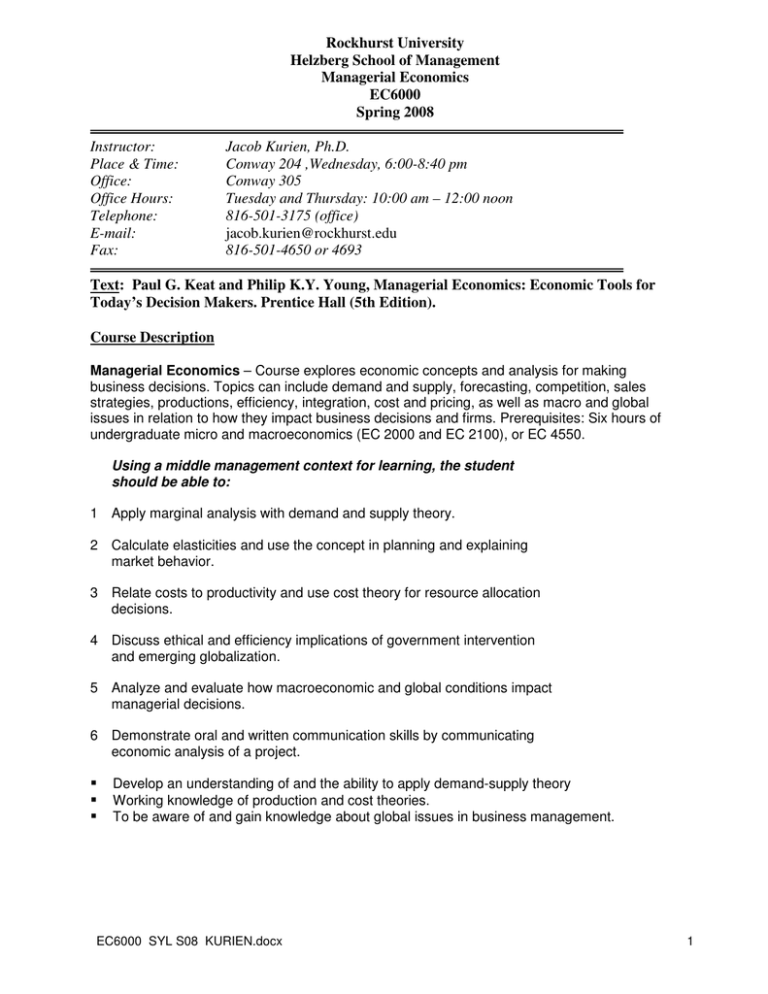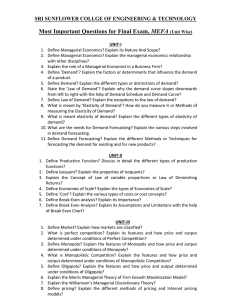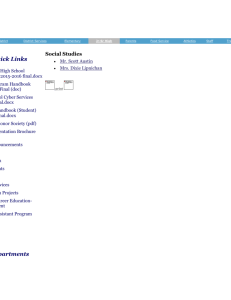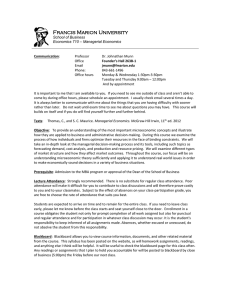Rockhurst University Helzberg School of Management Managerial Economics EC6000
advertisement

Rockhurst University Helzberg School of Management Managerial Economics EC6000 Spring 2008 Instructor: Place & Time: Office: Office Hours: Telephone: E-mail: Fax: Jacob Kurien, Ph.D. Conway 204 ,Wednesday, 6:00-8:40 pm Conway 305 Tuesday and Thursday: 10:00 am – 12:00 noon 816-501-3175 (office) jacob.kurien@rockhurst.edu 816-501-4650 or 4693 Text: Paul G. Keat and Philip K.Y. Young, Managerial Economics: Economic Tools for Today’s Decision Makers. Prentice Hall (5th Edition). Course Description Managerial Economics – Course explores economic concepts and analysis for making business decisions. Topics can include demand and supply, forecasting, competition, sales strategies, productions, efficiency, integration, cost and pricing, as well as macro and global issues in relation to how they impact business decisions and firms. Prerequisites: Six hours of undergraduate micro and macroeconomics (EC 2000 and EC 2100), or EC 4550. Using a middle management context for learning, the student should be able to: 1 Apply marginal analysis with demand and supply theory. 2 Calculate elasticities and use the concept in planning and explaining market behavior. 3 Relate costs to productivity and use cost theory for resource allocation decisions. 4 Discuss ethical and efficiency implications of government intervention and emerging globalization. 5 Analyze and evaluate how macroeconomic and global conditions impact managerial decisions. 6 Demonstrate oral and written communication skills by communicating economic analysis of a project. Develop an understanding of and the ability to apply demand-supply theory Working knowledge of production and cost theories. To be aware of and gain knowledge about global issues in business management. EC6000 SYL S08 KURIEN.docx 1 Course Requirements Basic Mathematics and Statistics Method of Instruction: Class lectures, use of instructional aids, take home work sheets, and discussions. Attendance: It is required that students attend classes regularly and come on time for the class. However, if a student expects to miss class for personal reasons, prior permission of the instructor is required. The instructor can drop a student from the class or lower the grade for lack of attendance. Students are responsible for keeping track of their attendance. Evaluation There will be two tests and a final exam at the end of the semester. Team Presentation and a term paper will supplement the tests as components for evaluation. Test I Test II Final Exam Team Presentation Term Paper Total 50 points 50 points 50 points 25 points 25 points 200 The format for the tests will be as follows: a) True/False b) Multiple Choice c) Problem solving d) Essay questions Grades: 90% or above = A (Outstanding) 80%-89% = B+ (Above average) 70%-79% = B (Average) 60%=69% = C (Below average) Less than 60%= F (Fail) 180-200 points 160-179 140-159 120-139 below 120 points Make-up Exams It will be given to only those students who miss an exam for valid reason. The student must inform the instructor about his/her inability to take the exam on the scheduled date. The make-up exams must be taken before the end of the scheduled test week. For scheduling the make-up exams, the student must contact the HSOM Dean’s suite. Exams are given on Monday 8-10:30 am, Tuesday and Thursday 2-6:00 pm. EC6000 SYL S08 KURIEN.docx 2 Team Presentation Each team will consist of 5-6 members. A contemporary economic/financial/management issue will have to be researched and presented by the team. A proposal indicating the topic chosen for presentation and the task delegated to each member will have to be submitted to the instructor for approval. Each member must submit a summary report (2-3 pages) of their individual contribution towards the group presentation. Provide copies of referred documents. Term Paper At the beginning of the semester a research proposal will have to be submitted for comments and suggestions. The proposal should focus on an economic issue of interest to you and conforms to the course outline. The format to be followed: • Name • Title of paper • Table of contents • Brief review of the researched material, comments, observations, analysis and conclusions. • List of the references, with documentary support, e.g., photocopy, original articles, information downloaded from the website. • Staple the above document/s to the final term paper. • The term paper must be printed; double-spaced and should not exceed 5-8 pages in length. • Submit your proposal along with the term paper. A term paper must: 1. COMPLY with the format. 2. NOT be plagiarized. 3. BE concise and analytical. 4. BE submitted on time. ADA Statement • RU official policy: “Rockhurst University is committed to providing reasonable accommodations for students with disabilities. Please contact Sandy Waddell, Director, Access Office (Massman Hall Room 7, (816) 501-4689, sandy.waddell@rockhurst.edu) to provide documentation and request accommodations. If accommodations have already been approved by the Access Office, please communicate with the instructor of this course regarding these arrangements by the second week of class in order to coordinate receipt of services.” Student Contact Information: • RU official policy: “Student contact information must be kept current in order to receive important notices from Rockhurst University. Your contact information is online via your BannerWeb account. Please check your local address, local phone number, and emergency contact information on BannerWeb and revise as needed. All important University notices will be sent only to your RU email address. Please check your RU email account in addition to any other email accounts you may have. Accounts are activated at the Computer Services Help Desk (Conway 413).” EC6000 SYL S08 KURIEN.docx 3 Academic Honesty Policy: • Plagiarism and cheating will not be tolerated. The Rockhurst University Catalog provides examples of academic dishonesty and outlines the procedures, penalties, and due process accorded students involved in academic dishonesty. All infractions will be immediately referred to the Dean's office. In your research paper, make sure you provide citations for all ideas and information that are not your own. Course Outline Managerial Economics EC6000 Spring 2008 Chapter Title Introduction Chapter 1 The Firm and Its Goals Chapter 2 Supply and Demand Chapter 3 Demand Elasticity Chapter 4 Demand Estimation and Forecasting Chapter 5 The Theory and Estimation of Production Chapter 6 The Theory and Estimation of Cost Chapter 7 Game Theory and Asymmetric Information Chapter 11 The Multinational Corporation and Globalization Chapter 13 EC6000 SYL S08 KURIEN.docx Topics Scope, nature and relevance; managerial decision making; managerial rule of thumb; economics of business; review of terms and concepts; basic economic questions The firm; economic and non-economic goals; profit maximizing and maximizing stockholders wealth Market demand and supply; market equilibrium; rationing and allocative functions of price Concept and the measure of price elasticity of demand; determinants of elasticity; demand elasticity and revenue; Cross and income elasticity of demand Regression analysis; estimating and interpreting the regression coefficients; problems in the use of regression analysis; prerequisites of a good forecast and forecasting techniques; economic indicators Production function; short-run analysis; the law of diminishing returns; importance of production functions in decision making Importance of cost in decision making; relationship between production and cost; economies of scale and scope Introduction Taxonomy of games; Prisoner’s Dilemma; game theory and actions; Asymmetric information; Adverse selection and moral hazard Meaning and goals of globalization; Is globalization good or bad? Future prospects; risk factor; exchange rates and foreign direct investments 4 Tentative Study Plan Week I 01-23-08 II 01-30-08 III 02-06-08 IV 02-13-08 V 02-20-08 VI 02-27-08 VII 03-05-08 VIII 03-19-08 IX 03-26-08 X 04-02-08 XI 04-09-08 XII 04-16-08 XIII 04-23-08 XIV 04-30-08 XV 05-07-08 XVI 05-14-08 Assignment/Chapter Introduction CHAPTER 1 The firm and its goal CHAPTER 2 Supply and Demand CHAPTER 3 Demand Elasticity CHAPTER 4 Test Review Test I Demand Estimation and Forecasting/CHAPTER 5 Team Presentation The Theory and Estimation of Production/CHAPTER 6 Team Presentation The Theory and Estimation of Cost CHAPTER 7 Team Presentation The Theory and Estimation of Cost CHAPTER 7 Team Presentation TEST REVIEW/TEST II Game Theory and Asymmetric Information CHAPTER 11 Team Presentation Submit paper Game Theory and Asymmetric Information CHAPTER 11 Team Presentation The Multinational corporation and Globalization CHAPTER 13 Team Presentation The Multinational corporation and Globalization CHAPTER 13 Team Presentation FINAL EXAM REVIEW Team Presentation FINAL EXAM Dates to remember: 01-30-08 02-06-08 02-20-08 04-02-08 04-09-08 04-14-08 Submit your term paper proposal Submit the names of team members and topic for team presentation I Test II Test Submit Term Paper FINAL EXAM EC6000 SYL S08 KURIEN.docx 5





